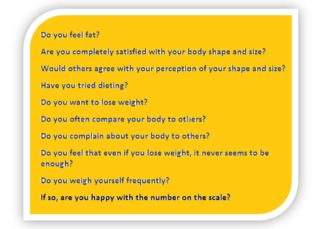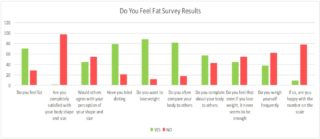Do You Feel Fat?
Do you feel as though your clothes just don’t fit the way you would like them to? Do you feel anxious about the upcoming summer months and losing the layers of winter clothing? Do you feel like the battle to lose weight and feel great is an endless one? Well, you’re not alone.
‘Do you feel fat?’ is an abrupt question and may be intimidating for many to answer, but the reality is that it is, in fact, how many of us are already feeling, and the majority of us would respond ‘yes’. I felt a bit apprehensive in using this very question as the title of my blog and the tagline of our advertising campaign for the month, but throughout my research for this blog, I came to learn that the fact of the matter is that asking people this question is really just getting to the point and not ‘avoiding the elephant in the room’, so to speak. This trend is not surprising given the media’s influence on people’s perception of what is considered to be ‘fat’. Responding affirmatively to this question does not necessarily mean that our weight or body mass index (BMI) falls within a category that is considered to be overweight or obese, nor would it confirm without a doubt that our body shape or size is posing any risk to our health. I am not saying that feeling fat never equals being fat, but I am saying that the former can, and most definitely does in many cases, exist without the latter.
I was interested in collecting some numbers so that I could really see if what I thought was happening was really happening – if many people felt fat and were dissatisfied with their body. I anonymously surveyed 100 people of varying characteristics, ages, genders, and cultures. I asked them a series of questions, which were as follows:

The results were what I had expected, yet for some reason I was still surprised by what I saw.
I know that a lot of people feel fat, and I know that many are dissatisfied with their body, but seeing the numbers really drove the point home – people’s undesirable body image, whether justified or not, is a real problem.

Click here to see a bigger image: do-you-feel-fat-surevy-results
As you can see in the graph above, the majority of people we surveyed feel fat, are not satisfied with their body, have tried dieting, would like to lose weight, compare their bodies to others, and are unhappy with the number on the scale. Surprisingly, many even said that others would not agree with their perception of their shape and size, suggesting that this may be a group of individuals who feel fat, but perhaps would not necessarily meet the true criteria for being fat or may not be seen as fat by others. Let’s face it – we are typically our own worst enemy and toughest critic!
There are a number of assumptions we can make when analyzing these results. Here are a few assumptions that I have made based on these results, but there are definitely still other angles that can be taken.
- Many people are in fact overweight: It is known that overweight and obesity is a real problem in the current world, and perhaps the reason that many confirmed that they feel fat, are unhappy with the number on the scale, and are dissatisfied with their body, is because they are, in fact, overweight or obese. Again, this is just an assumption we can make since we did not ask any information in our survey about weight classification or BMI. Statistics Canada reported that in 2014, 61.8% of Canadian men and 46.2% of Canadian women were said to be overweight or obese based on their BMI classification (The Huffington Post, 2015). If being overweight or obese is where the problem lies, then behavioural intervention (i.e. eating behaviour, exercise, education, etc.) is required to prevent weight gain to a level that puts people into these categories.
- The majority of people have a negative body image: Whether or not individuals fall into the overweight or obese categories, it is evident that body image is a real issue that needs to be addressed. The Canadian Women’s Health Network supports this point as it reports that 80% to 90% of women and girls in Canada are unhappy with the way they look (CWHN, 2012). Women are not the only ones dealing with body image issues as many people may think. The Guardian reported that more than 81% of men talk in ways that promote anxiety about their body image by referring to perceived flaws and imperfections, compared with 75% of women (The Guardian, 2012). The study also found that 38% of men would sacrifice at least a year of their life in exchange for a perfect body. If body image is where the problem lies, then psychological intervention is needed to help individuals maintain a positive perception of their size and shape – a positive body image.
- The media and cultural trends have influenced unrealistic and likely unhealthy perceptions of what is considered to be an attractive body shape and size: If we look back over the years, the ‘perfect’ body shape and size has changed drastically, and what may have been considered ‘attractive’ or ‘desirable’ decades ago, would now be considered ‘fat’, ‘unattractive’, or ‘undesirable’. This video shared by BuzzFeedVideos in 2015 shows the ideal body types over time: https://www.youtube.com/watch?v=Xrp0zJZu0a4. The media’s view of ‘the perfect body’ is not static and so why should we keep trying to chase it, rather than learning to love the body we have, as long as we are doing what is needed to keep it healthy. If you feel fat, consider how much the media is playing into that feeling. If the media and its strong influence over our perceptions is where the problem lies, then educational intervention is needed to help individuals understand that different body shapes, types, and sizes exist, and that striving to be something we are not can cause more harm than good.
There are indeed other interpretations or conclusions we can make based on the results of our mini study’s results, however, there seems to be one overarching issue that needs to be addressed, regardless of the root of the problem – people feel fat, are unhappy with their bodies, and are looking for solutions. If people continue to feel fat, a chain reaction of other problems can begin.
Some studies, including one done in 2012 by The Norwegian University of Science and Technology, found that thinking you are fat or feeling fat can actually lead to you becoming fat. They identified a number of reasons supporting why this may happen, such as the psychosocial stress of trying to achieve the ‘ideal body type’, skipping meals, and ‘yo-yoing’ on and off unsustainable diets. Other studies, including a body image study done by researchers at Bradley Hospital, Butler Hospital, and Brown Medical School, have looked at the effect of having a negative body image on psychological health. This study and others like it have concluded that adolescents with negative body image concerns are more likely to be depressed, anxious, and suicidal than those without intense dissatisfaction over their appearance, even when compared to adolescents with other psychiatric illnesses. They also found that in addition to higher levels of depression, anxiety and suicidality, patients with shape/weight preoccupations expressed higher levels of dissociation (a coping style characterized by blocking out emotions), sexual preoccupation/distress, and post-traumatic stress disorder (PTSD), and that the majority of the adolescents in the study were not actually overweight. This suggests that weight may not be the problem, but rather the perceptions that individuals have of themselves, whether or not they are in fact overweight.
At Odyssey Health Services Inc. we understand this issue, and have developed an effective psychological, educational, and behavioural solution. Our approach to this issue may be different than others and may be new to many people, but it is supported by the scientific evidence, and we encourage it with confidence. It allows us to tackle all of the issues that have been researched around ‘’feeling fat’’, including the true need to lose weight, the need for proper education around eating behaviours and perceptions of ‘the perfect body’ and psychological strategies around acceptance, engagement in life regardless of how you feel, and coping with challenges or barriers along the way.
Our solution is ACT for Mindful Eating. This 10-session course begins in September of 2017. Students will learn to approach all of their behaviours more mindfully, from grocery shopping to food preparation to eating in restaurants and at work, and to maintaining a risk free eating environment in the home. Mindful Eating helps us to better understand, appreciate and, when needed, change our relationship with food. Mindfulness helps us to foster a non-judgemental acceptance of things as they are in the present moment (i.e. our current body shape and size), notice what can and cannot be changed, move towards what is meaningful to us, and to continue along that very path regardless of the ‘stuff’ that interferes or may try to stop us on our way.
We can quite reasonably assume that many of you reading this will have felt fat at some point, may feel fat right now, or may know someone that feels fat, and we can help. Please feel free to get in touch with us if you are interested in hearing more about what we can do for you.
![]()


